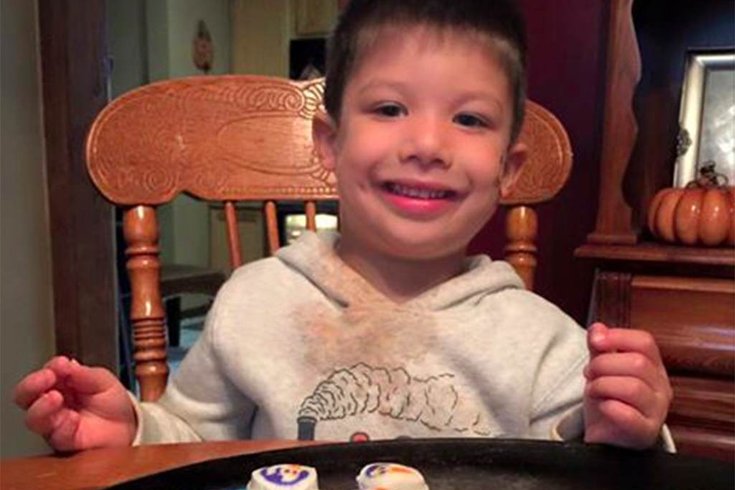
October 22, 2015
 Source/Facebook
Source/Facebook
The body of Brendan Link Creato, 3, was found on the morning of Oct. 13, 2015, in a wooded area in Haddon Township. On Jan. 11, 2016, investigators announced the boy's father, David "DJ" Creato Jr., of Haddon Township, New Jersey, had been indicted by a grand jury on charges of first degree murder in connection with his son's death.
Even as the family of Brendan Creato holds a viewing Thursday and funeral Friday for the toddler, there still are no definitive answers about how his body got to Camden County’s Cooper River Park – or how he died.
The three-year-old’s lifeless body was discovered nine days ago by a police dog in a wooded strip of parkland between a road and the Cooper River, nearly three-quarters of a mile from the Haddon Township apartment he shared with his father, David “DJ” Creato.
Feigin, who had performed the autopsy on an eight-month-old boy, Matthew Eappen, who died in the care of English au pair Louise Woodward, had initially claimed a fall of 15 feet killed the baby.
The pathologist eventually acknowledged that a drop of as little as two feet could have fractured the child’s skull. It also turned out critical evidence from his examination was not preserved.
Woodward, who was convicted on a second-degree murder charge, had her sentence reduced to involuntary manslaughter and was released from prison after serving fewer than 200 days.
Feigin was also criticized for failing to perform a key test in the case of a teenager accused of manslaughter in the death of a middle school teacher in Lowell, Massachusetts.
The teacher died six months after being kicked in the head while breaking up a fight.
Feigin ruled the teacher died from the blow, but another medical examiner conducted a test on samples from the case and concluded the teacher may have died due to heart problems. Manslaughter charges against the teenager were reduced to assault as a result.
Gloucester County’s then-freeholder director, Stephen Sweeney, now the state senate president, championed the hiring of Feigin in 1998.
Two of Feigin’s colleagues this week independently told PhillyVoice the pathologist is known for taking shortcuts, though they did not want to be identified.
Andy McNeil, a spokesman for the Camden County prosecutor said Thursday: "After conducting the autopsy, (Feigin) called in two colleagues – one of whom is the Acting State Medical Examiner – so that a team of experts could review the post-mortem examination."
McNeil offered no insight into the review of Feigin's autopsy by Dr. Andrew L. Falzon and a colleague.
Falzon would be the first top state medical examiner in six years if he were eventually approved for appointment. State law requires a medical examiner, despite the long vacancy.
The state’s medical examiner is supposed to oversee county medical examiners, though that has not happened for years.
A spokesman for the state attorney general and medical examiner – the latter reports to the former – declined comment.
He referred questions to the office of the Camden County Prosecutor, Mary E. Colalillo.
Likewise, a Gloucester County spokeswoman also referred questions to the Camden prosecutor despite the fact that Feigin technically is a Gloucester County employee. (He is paid by Camden and Salem counties, as well as Gloucester, but he works in Gloucester County.)
Andy McNeil, a spokesman for the Camden County Prosecutor, issued a statement Wednesday saying the results of the autopsy remain pending and the investigation continues.
The uncertainty and lack of information is particularly troubling in a suburban community filled with families and small children.
“The questions raised are exactly what neighbors like myself are desperate to find out. We're worried for our children's safety and are afraid that as more time passes, the tragic death of this toddler will remain unsolved. We are a community on edge,” a township resident told PhillyVoice.
Residents have reason to worry.
“I don’t think for one moment you should think anything is natural” about Creato’s disappearance and death, said forensic consultant and former medical examiner Pete Speth, who was no stranger to controversy.
Speth said smothering of a child might not be evident on a basic autopsy dissection, but a dissection of multiple layers of the throat, taken as a last step when all of the blood is drained from a body, could reveal hidden hemorrhages.
Likewise, micro-bruising of a child’s arm or legs during a wriggling struggle, would not show unless skin is peeled back, added Speth.
It is unclear if those procedures were undertaken in Feigin’s examination of the little boy.
But Speth recalled that Feigin had once told him in direct conversation: “Any forensic autopsy that takes more than 20 minutes is too long.”
Another pathologist said: “For all baby cases, when inconclusive initially, microscopic examination and scene investigation and police investigation will be critical.”
